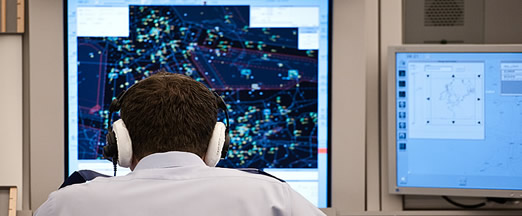Breaking through the confidence barrier
11 June 2014You’ve got through the selection process and started your air traffic controller training.
But it’s not easy training as an air traffic controller. It takes time, intelligence and last, but by no means least, determination. Getting to grips with any new set of skills as complex as air traffic control requires a huge amount of work. Along the way, there can be times when trainees may struggle with some of the challenges that come their way – you can see that this could knock their confidence. Or imagine getting near to the end of your training and not making it through one of your final tests.
Quite often it’s clear that a trainee has the skills and knowledge to become an air traffic controller but the barrier to their ultimate success is a lack of confidence that they can succeed. Our trainees have to be resilient to set backs. And having invested heavily in their selection and training, NATS wants to maximise training success. So it’s in everyone’s interest to break through these confidence barriers.
Confidence and resilience are recognised across industries as increasingly important employee attributes. Importantly, these are characteristics that can be learnt, developed and practiced, given the right guidance and coaching.

Over the last 18 months or so, NATS Human Factors have worked with a number of trainee controllers who have the right skills but have experienced a lack of confidence in their own abilities for one reason or another. Through one-to-one coaching, they have been given strategies and techniques to overcome confidence issues and become more resilient to set backs. Already we have seen some successfully get through to the end of their training and ‘validate’ as fully fledged controllers. One newly qualified controller said: “Just to let you know, I finally validated on Thursday. It’s a massive relief after spending so long training. Thank you so much for all your help and support along the way – I definitely owe you a coffee or two next time I see you around”.
And the same confidence and resilience programme is helping qualified controllers to adapt to new technologies and increasing demands. It is also helping them regain their confidence and ‘bounce-back’, for example after a health-related break from controlling.
The ability to learn and apply new skills, whilst overcoming adversity has become important for employees across many different industries, not least those in highly complex roles such as air traffic control. Having the confidence and resilience to get through training and continue to apply those skills throughout your career cannot be understated.
Comments
Please respect our commenting policy and guidelines when posting on this website.




11.06.2014
10:51
Peter Hargreaves
An interesting article. It would be even more interesting to know more about how human factors training has developed in ATC. There did not seem to be much interest in it during my time (1963-2002).
11.06.2014
14:01
Martin Cox
Principal Human Factors SpecialistHi Peter,
I’m glad that you found the article interesting. Human Factors (HF) is now included throughout controller training, beginning with a general look at ‘optimising learning’ at the start of the course and introducing trainees to Human Factors theories and practical tools and techniques at key stages of their progression. By the time they are validated, our controllers have a good practical understanding of HF and how it influences the way they work. However, HF training doesn’t stop there. We also work closely with the individual units to understand all their specific HF training needs and provide subsequent and wide ranging support. We also offer HF courses outside of NATS which shows how much more interest there is now in this area.
14:01
Martin Cox
Principal Human Factors Specialist